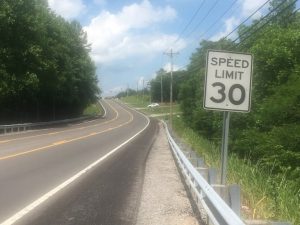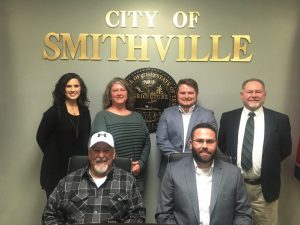News
Mayor and Aldermen to Consider Changing Term of Municipal Judge Position from Two to Four Years
June 7, 2022
By: Dwayne Page
Should the Smithville Municipal Judge position be a four year rather than a two-year term?
The Smithville Mayor and Aldermen may decide during a special called meeting set for Thursday, June 23 at 6 p.m. at city hall. This issue will be on the agenda along with second and final reading passage of the 2022-23 budget ordinance following a public hearing.
Since 2006, the municipal judgeship has been a two-year term position with the judge being appointed by the Mayor and Board of Aldermen. The salary is $1,000 per month. Prior to 2006 the city judge was elected by the voters of Smithville to an eight-year term.
The incumbent city judge Gayla Hendrix was appointed to her first two-year term in 2020 and it expires August 31. If she is re-appointed this fall it would be to a four-year term, if the Mayor and Aldermen were to decide to make the change in the term of office from two to four years.
The municipal judge primarily hears minor city traffic offenses and city ordinance violations.
Speed Limit to go from 30 to 45 mph on North Congress Boulevard
June 7, 2022
By: Dwayne Page
The speed limit is changing from 30 to 45 miles per hour on Highway 56 (North Congress Boulevard) between Church Street (near the Police Department Building) and Smith Road near the Northside Church of Christ.
During Monday night ‘s regular monthly meeting the aldermen adopted on second and final reading following a public hearing an ordinance to change the speed limit there based on a traffic study by the Tennessee Department of Transportation. No one showed up to express any opposition to the plan.
Mayor Josh Miller said last month that Alan Wolfe, Regional Traffic Engineer at TDOT sent him a letter with the recommendation after the study was completed.
“I was asked to call the state about doing a speed study on Highway 56 in the city limits. Mr. Alan Wolfe of TDOT did the study and this was his response.
Reading from Wolfe’s letter, Mayor Miller said “We have completed our speed study for this section of State Route 56 in Smithville. Based on the results of the study we recommend the speed limit remain 30 miles per hour from Highway 70 to just north of the State Route 56 intersection at Church Street. From north of Church Street we recommend raising the speed limit to 45 miles per hour all the way to the existing 45 mile per hour speed zone where the turn lane ends just north of the Northside Church of Christ”.
A speed limit of 25 miles per hour will still be enforced in the school zone mornings and afternoons at Northside Elementary School.
City of Smithville employees to get pay raises in new budget
June 7, 2022
By: Dwayne Page
City employees will soon be getting a pay raise.
The Smithville Mayor and Aldermen Monday night during their regular monthly meeting adopted on first reading a budget ordinance for the 2022-23 fiscal year which includes an 11% pay raise for all city employees.
Second and final reading passage of the budget is scheduled for June 23 at 6 p.m. at city hall following a public hearing.
The city property tax rate will remain at 0.7523 cents per $100 of assessed value which is expected to generate $1,350,000.
Water and sewer rates, which went up by 2% last year, will increase by 4% this year.
The new rates for city water customers will be $7.70 per thousand gallons of usage. Rates for customers outside the city limits will be $11.55 per thousand. City sewer customers will pay $7.17 per thousand. Tap fees are also being increased.
In addition to the employee raises, the mayor’s pay is being increased from $1,000 to $2,000 per month ($24,000 per year). Pay for each of the five city aldermen will also be doubled from $50 to $100 per meeting (regular and special meetings) and will include workshop meetings (up to $2,400 per year total budgeted for each member).
The new budget also includes the addition of a third paid firefighter (budgeted salary $35,131 plus benefits); making the part-time airport manager position full time (budgeted salary $40,000 plus benefits), increasing the salary of the golf pro shop/pool manager to ($36,000 plus benefits),increasing the 25 volunteer firefighters pay from $25 to $35 per call (total budget $70,000); purchasing a small garbage truck ($115,000), two police cars and related equipment ($82,000), a new roof for the city hall building ($100,000); two new heat and air units for the city hall building ($42,000); the refurbishment of the playground and benches at Green Brook Park ($48,000); tire changer and balancer for the public works department ($15,000); fire department portable radios, new air bags and controller, pickup truck, and site work training (total $61,000). Funds are also included for street paving ($335,000 including $250,000 grant); $699,012 in an obstruction clearing grant for the airport; Fixed asset water and sewer department additions: meter reading software ($12,000), tube settlers ($30,000), and replacement of sewer lines ($703,000 using half of the Federal American Rescue Plan Act Grant Funding).
Through a longstanding agreement, the City of Smithville, DeKalb County Government, and the DeKalb School District, share in the annual cost of paying two traffic control officers in the school zones mornings and afternoons (during the school year) at Northside Elementary School and at DeKalb Middle School/DCHS. The positions are filled by two constables who each earn $17 per hour up to 440 hours per year. Subject to final approval of the funding bodies, the city, county, and school district this year are budgeting an increase in their share of the cost to bring the constables up to $20 per hour for this service.
The city’s annual contribution the Smithville-DeKalb County Rescue Squad is increasing from $2,000 to $3,000 with passage of this budget.
General Fund Debt Service for the new police department building is projected to be $172,550 for the year including $100,000 in principal payments and $72,550 in interest on long-term debt.
According to the budget, the city general fund is projected to finish the 2022-23 year with a $186,440 surplus but the surplus for the water and sewer fund is expected to be only $6,403 by June 30, 2023.
Ending cash by June 30, 2022 in the general fund is estimated to be $5,873,189 and $3,803,848 in the water and sewer fund.
« First ‹ Previous 1 675 765 773 774 775776 777 785 875 2494 Next › Last »











